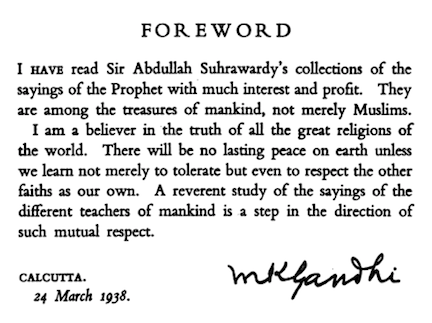
Sir Abdullah Suhrawardy
The . . . translator of these sayings, Allama Sir Abdullah al-Mamun al-Suhrawardy,
Barrister-at-Law, M.A., Ph.D., D.Litt., LL.D., Iftakar-ul-Milla, Kt., Commander of the
Order of Medjedie, was born at Dacca in 1882, and died at Calcutta on the 13th January,
1935. The obituary notice in the London Times of 14th January, 1935, gives many
details of his life and work, but it does not mention the little book The Sayings of
Muhammad, than which none of his works was nearer to his heart. There is also no
reference to the fact that Abdullah was an extraordinarily brilliant student, winning a
number of stipends and scholarships throughout his school and college career. He
graduated with honours in Arabic, English and Philosophy, obtaining a first class in his
special subjects and standing the first of his year both in the B.A. and M.A.
examinations of Calcutta University. He was also first to obtain the Ph.D. degree of the
Calcutta University. While studying for the Bar, he took his M.A. degree from the London
University, and used to add to his slender allowance from India by lecturing on Arabic
letters and jurisprudence, subjects to which he contributed in his later writings and
teachings much of value and freshness.
In February 1905 when The Sayings of Muhammad was first
published, Abdullah was a young man burning with zeal for Pan-Islamism and dedicating
his extraordinary energy and talent to a vision he had of uniting into one cultural and
economic, if not political, whole lands which were under Muslim rule, or had a large
Muslim population. The Pan-Islamic Society of London, of which he was the founder and
first secretary, was at that time an extremely active and vigorous body preaching Islam,
converting British and continental Christians, and carrying on intense propaganda for
Pan-Islamic unity. The Sayings of Muhammad was one of the Society's publications.
Containing as it does some of the finest Sayings of the Prophet, it attracted the
attention of minds widely removed from the ranks of orthodox Islam. It was quoted from
in many books and journals, and parts of it were translated into several European
languages. An interesting testimony to its success was the correspondence which was
initiated after its publication between my late brother and Leo Tolstoy and which continued
until the count's death. He had come to appraise the personality of the Prophet through
this volume, and I am told by a nephew of mine on the authority of one of his daughters
whom he had met in Russia that a copy of this book was found in the large overcoat in
which he had wrapped himself before setting out on that last walk of his to die in the
fields he used to till.
The book had long been out of print, and I had a great deal of
difficulty in obtaining it. An old friend of the family sent me his copy from Scotland,
and in 1938, with the help of Mr. N. Mukherjee, Proprietor of the Art Press, Calcutta, a
reprint was brought out. [foreword by Mahatma Gandhi]
For the purpose of the present edition, . . . Mr. Mahmood R. Zada,
First Secretary of the Royal Legation of Saudi Arabia in London, has compared the
'Sayings' with the original Arabic, and helped me translate them into simple English.
Out of the 451 'Sayings' in the original publication, we have re-translated 150 and
deleted 35 of which we failed to find the original Arabic.
Hassan Suhrawardy
January 1941


|
|